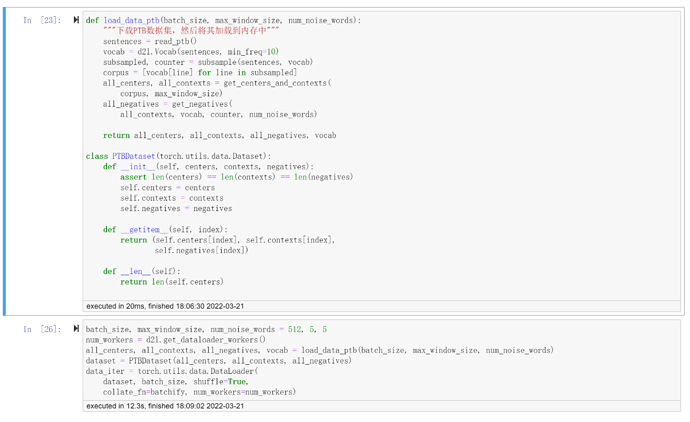http://zh-v2.d2l.ai/chapter_natural-language-processing-pretraining/word-embedding-dataset.html
Can’t pickle local object ‘load_data ptb.<locals>.PTB Dataset’
我在运行“把所有东西放一起”小节的代码块时,出现如上错误。
猜测可能是
class PTBDataset 的定义放在 load_data_ptb 中导致这个问题的出现。
我按你的操作把class PTBDataset放在外面了,运行到for batch in data_iter: 是提示另外一个错误:
Can't pickle <class '__main__.PTBDataset'>: attribute lookup PTBDataset on __main__ failed上网搜了一下,把num_workers改为0就可以运行,不知道为什么
看网上把说num_workers 改为 0就不启用多进程,不会预加载多批次数据进入内存。
d2l里默认值是4。
def get_dataloader_workers():
"""Use 4 processes to read the data."""
return 4
不清楚为什么在我的台式机上也是改成0才行,试过1、2、4都不行。。。
多线程问题,改
num_workers 也行,或者将代码重构,如图
def load_data_ptb(batch_size, max_window_size, num_noise_words):
"""下载PTB数据集,然后将其加载到内存中"""
sentences = read_ptb()
vocab = d2l.Vocab(sentences, min_freq=10)
subsampled, counter = subsample(sentences, vocab)
corpus = [vocab[line] for line in subsampled]
all_centers, all_contexts = get_centers_and_contexts(
corpus, max_window_size)
all_negatives = get_negatives(
all_contexts, vocab, counter, num_noise_words)
return all_centers, all_contexts, all_negatives, vocab
class PTBDataset(torch.utils.data.Dataset):
def __init__(self, centers, contexts, negatives):
assert len(centers) == len(contexts) == len(negatives)
self.centers = centers
self.contexts = contexts
self.negatives = negatives
def __getitem__(self, index):
return (self.centers[index], self.contexts[index],
self.negatives[index])
def __len__(self):
return len(self.centers)谢谢大佬,问题已经解决,请问这个问题出现的原因是什么呢
负采样时使用的词频分布是用下采样之前的词频生成的,为什么不用下采样之后的词频生成这个分布?
负采样的时候应该尽可能选一个高频词,因为一个高频词是负例比一个稀有词是负例更常见、更重要。而下采样是剔除了高频词,和负采样略微冲突。
一开始 AttributeError: module ‘d2l.torch’ has no attribute ‘show_list_len_pair_hist’ 更新d2l至d2l 1.0.0a0 以后
AttributeError: module ‘d2l.torch’ has no attribute d2l.count_corpus了 ![]() 肿么办呀
肿么办呀
快点看到我哦!在线等 挺急的 拜托拜托 ![]()
pip install d2l==0.17.5 -I
这样行不行?
tiny_dataset = [list(range(7)), list(range(7, 10))]
print('数据集', tiny_dataset)
for center, context in zip(*get_centers_and_contexts(tiny_dataset, 2)):
print('中心词', center, '的上下文词是', context)
我想知道这段代码的运行结果中为什么0的上下文词不是[1, 2]
这个function在第RNN那一章text preprocessing。你跑一次它就存在d2l里里
中心词和上下文词的提取时, 随机采样1到max_window_size之间的整数作为上下文窗口, 为什么不直接用max_window_size而要用随机❓用随机是基于什么原理和考虑?
num_workers改成0也还是不行 ![]()
Answer from ChatGPT:
在Word2Vec中,上下文窗口是指在训练过程中,用来确定中心词周围哪些词作为上下文进行预测的窗口大小。这个窗口的大小可以影响到模型的性能和训练效果。
使用随机采样一个介于1到max_window_size之间的整数作为上下文窗口,而不是固定使用max_window_size,有一些原理和考虑:
- Diversification(多样性):随机采样窗口大小可以引入更多的多样性,使得模型不仅仅关注固定大小的上下文窗口。这样可以更好地捕捉不同距离的关系,避免过于集中在一个特定的上下文范围内。
- 平衡计算复杂度:较大的上下文窗口可能会引入更多的噪声,因为与中心词距离较远的词可能与中心词的语义关联较弱。同时,较大的窗口可能会增加计算的复杂度,因为要考虑更多的上下文词。通过随机采样窗口大小,可以在捕捉不同距离关系的同时,平衡计算的复杂度。
-
训练稳定性:随机窗口大小可以提高模型的训练稳定性。如果总是使用固定的
max_window_size,可能会使模型对于固定距离范围内的关系过于敏感,从而导致训练不稳定。 - 对罕见词的处理:对于罕见词,较大的上下文窗口可能会导致模型将与中心词无关的词考虑在内,从而影响预测的准确性。随机窗口大小可以在一定程度上缓解这个问题。
综合考虑以上因素,使用随机采样一个介于1到max_window_size之间的窗口大小可以帮助模型更好地学习单词之间的关系,提高训练的效果和稳定性。
碰到相同情况,原因还是d2l包的版本不匹配造成,不能用最新的版本,需要使用书里推荐的版本
pip install d2l==0.17.6
在load_data_ptb函数里把 num_workers 改为0,运行成功。
在执行for batch in data_iter:时,还是会报AttributeError
#@save
def subsample(sentences, vocab):
"""下采样高频词"""
# 排除未知词元'<unk>'
sentences = [[token for token in line if vocab[token] != vocab.unk]
for line in sentences]
counter = d2l.count_corpus(sentences)
num_tokens = sum(counter.values())
# 如果在下采样期间保留词元,则返回True
def keep(token):
return(random.uniform(0, 1) <
math.sqrt(1e-4 / counter[token] * num_tokens))
return ([[token for token in line if keep(token)] for line in sentences],
counter)
subsampled, counter = subsample(sentences, vocab)
这里keep的公式计算是不是错了,f(w_i)是w_i的词数与数据集中总次数的比率,这里实现的时候是做了乘法
